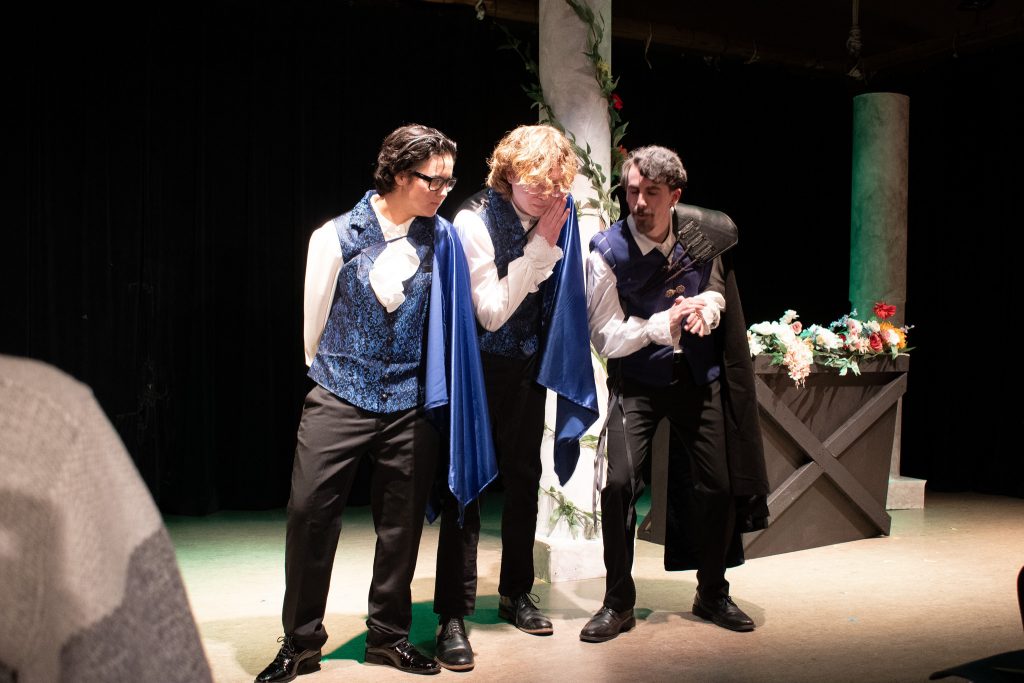The Hinman Production Company (HPC) opened their production of the Shakespearean comedy “Much Ado About Nothing” this past Thursday, Nov. 2, in the Nelson A. Rockefeller Collegiate Center. Shows began at 8 p.m. with one 2 p.m. matinee on Saturday. It ran for approximately two hours and 40 minutes with an intermission in the middle of act 3.
Shakespeare’s “Much Ado About Nothing” is a timeless romantic comedy, wrought with deceit and dramatic irony in classic Shakespearean fashion. Set in Messina, the play centers around a dual love story between soldier Count Claudio and the daughter of his host, Hero, and their friends Count Benedick and Hero’s cousin Beatrice. While Benedick and Beatrice despise each other and the idea of marriage at first, the careful plotting of Hero and the villainous Don John pairs the two together unexpectedly.
The set was kept relatively simple, with the major pieces consisting of large Greek columns adorned with roses and benches for the characters to sit on. The columns were wheeled around and repositioned throughout the show to reflect the changing settings, complementing the intricate nature of the Shakespearean plot.
Regarding the intricate plot and language used in Shakespearean shows, Luke Sullivan, director of the play and a junior double-majoring in history and English, worked explicitly with his cast and crew to overcome these practical challenges. It was clear while viewing the performances that the color of the lighting used was meant as a representation of the characters’ emotions — for example, in one soliloquy from Benedick, the stage goes green with envy and disgust.
Sullivan elaborated on the significance of properly telegraphing the emotions portrayed in the script.
“The most difficult thing about Shakespeare will always be the language,” Sullivan said. “It can scare away audiences, and even actors. I did comprehensive translation and interpretation with the actors so they were able to put their own spins on lines, and make everything their own. I aimed to keep the language unchanged, and focus on understandable inflection instead, so that even if the audience didn’t 100 percent understand, they’d get the gist.”
In attempts to preserve the integrity of the period in the face of these artistic decisions, Sullivan discussed his vision for the costume design in the production.
“I really just wanted the production to feel like period-piece Shakespeare,” Sullivan said. “While that might seem mundane, a lot of productions decide to go with modern dress or recontextualization of the setting. I just wanted plain old Shakespeare, as I have not really had the opportunity to see it myself. I think costume and set design help with that particularly.”
Karis Mueller, an actress in the play and a sophomore double-majoring in philosophy, politics and law and English, shed some light on the process she took in order to transmit the emotions of her character, Benedick, to the audience.
“I was most interested in bringing to life Benedick’s contradictions,” Mueller said. “[Benedick] constantly communicates that he is set in his ways and that he won’t change his mind, but Beatrice manages to undo all of that.”
Mueller went on to describe one of the biggest boons to the cast’s success over the course of the rehearsal process.
“One of the most important things about the show is that I felt comfortable with the people I was working with so I was able to bounce off of them,” Mueller said. “This involved a lot of cast bonding and constant experimentation to figure out what worked right for the scenes. Genuinely enjoying the company of this incredible cast and crew absolutely enhanced our chemistry on stage.”
Mueller’s scene partner, Elaina Pecora, the actress playing Beatrice and a freshman majoring in English, echoed this sentiment in her own words.
“The experience with my fellow cast members had a very large impact on my performance, and in the best way,” Pecora said. “The cast all spent a lot of the rehearsal process collaborating together in order to make the show as great as it could be, and along the way all wound up becoming super close and adding inside jokes that shined through in the performance. I can happily say that this show has given me some of my closest friends I’m lucky to have worked with.”
Pecora also emphasized the group’s dedication to overcoming the challenges provided by the antique language used in Shakespearean script.
“[We hope] that people can understand that Shakespeare isn’t something that has to be old and confusing,” Pecora said. “It’s something anyone can enjoy still to this day.”
And enjoy it they did. Despite the difficulties with understanding such complicated language, the HPC did a wonderful job in overtly portraying each and every emotion experienced by the characters in the play. It was met with a night full of laughter and applause from the audience. Most importantly, the HPC players succeeded in transporting the audience back to a time of chivalry, jealousy and love.



